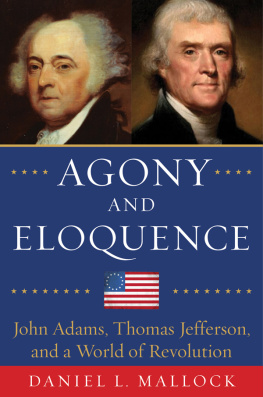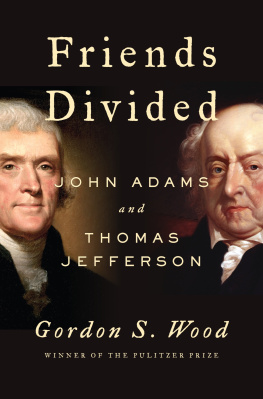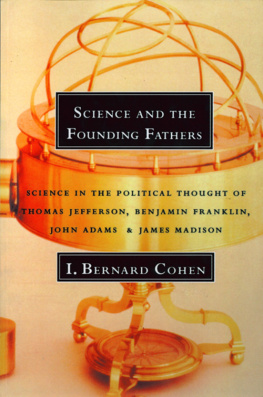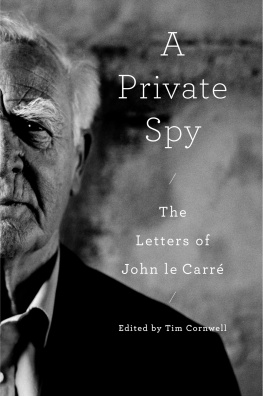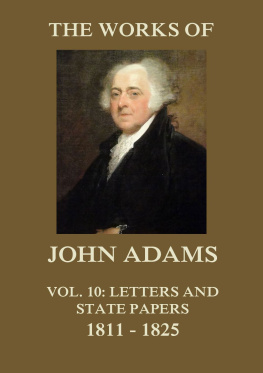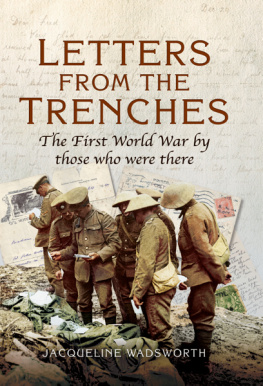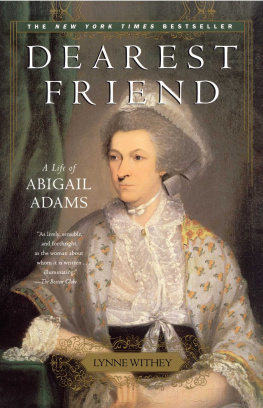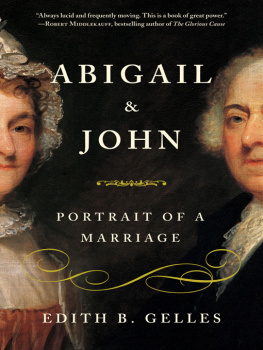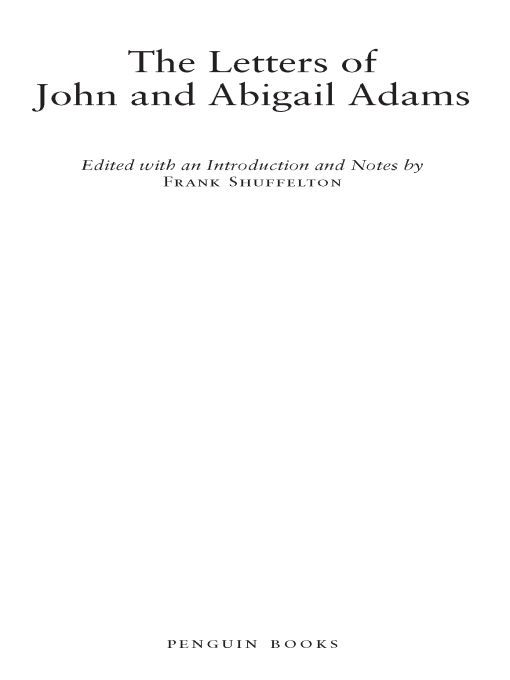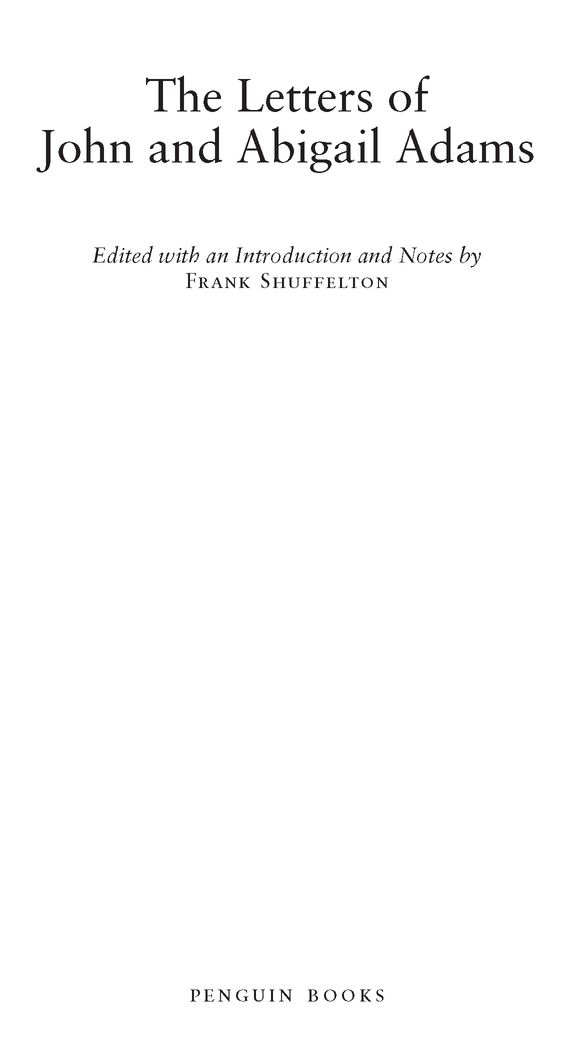Table of Contents
THE LETTERS OF JOHN AND ABIGAIL ADAMS
JOHN ADAMS, lawyer, writer, diplomat, was born in 1735 in Braintree, Massachusetts. He was a delegate from Massachusetts to the First and Second Continental Congresses, where he played a key role in creating a constituency for American independence from Great Britain. He served on the committee that drafted the Declaration of Independence and other important Congressional committees, including the Board of War and Ordnance, where his labors were crucial for supporting the military struggle. Between 1778 and the signing of a peace treaty with Great Britain in 1783, he was a diplomat in Europe, where his greatest success was in gaining from the Netherlands both recognition of the new United States and much-needed loans. Subsequently he served as George Washingtons vice-president and as the second president of the United States. He died on July 4th, 1826.
ABIGAIL SMITH ADAMS was born in 1744 in Weymouth, Massachusetts. She was educated at home but read widely and deeply both as a young woman and throughout her life. During her husbands nearly eleven-year absence from home, she cared for an extended family, managed the family farms, and carried on an extensive correspondence with her husband and her friends. She was also an important supporter and advisor to her husband during his years in the national government. She died in 1818.
FRANK SHUFFELTON is a professor of English and American literature at the University of Rochester. His other publications include Thomas Hooker, 1586-1647 (1977); Thomas Jefferson: A Comprehensive Annotated Bibliography of Writings About Him, 1826-1980 (1983); Thomas Jefferson, 1981-1990: An Annotated Bibliography (1992); ed., A Mixed Race: Ethnicity in Early America (1993); ed., The American Enlightenment (1993); and the Penguin Classics edition of Thomas Jeffersons Notes On the State of Virginia (1998).
Introduction
I
Among the celebrations in 1876 of the centennial of American independence, Charles Francis Adams offered under the title of Familiar Letters of John Adams and His Wife Abigail Adams, During the Revolution this collection of letters exchanged between his grandparents from 1774 to 1783. Charles Francis Adams had behind him a distinguished career as a politician and diplomat, but he had also become in effect the self-designated historian of the Adams family. In 1840 he had published a collection of Abigail Adamss letters that was sufficiently popular to get a fourth edition before the decade was out. He then edited and published between 1851 and 1856 a ten-volume collection of the writings of John Adams that continues to be an authoritative source for material not yet reedited in the ongoing Adams Papers project. When in 1876 he brought together in a single volume letters written by both Abigail and John, he claimed they would supplement the materials for a history of action [with] those for one of feeling.
As Charles Francis Adams saw it, the American Revolution had typically been portrayed in terms of the great men like Patrick Henry, James Otis, George Washington, Thomas Jefferson, and Samuel Adams who were thought to have made it. But such accounts overlooked the moral principle in the field, to the power of which a great majority of the whole population of the colonies, whether male or female, old or young, had been long and habitually trained to do homage. The failure of American historians in the one hundred years since independence to recognize the moral principle behind the Revolution was connected, in Adamss view, to the failure to recognize the contributions of the Adams family to the continuing project of American liberty. The centennial year of independence offered an apt occasion for once again trying to set the record straight by recentering the historiography of the Revolution on character, both private and public.
Charles Francis was carrying on a campaign for recognition that his grandfather had begun in the years after he returned home to Braintree, Massachusetts, in 1801, defeated in his candidacy for a second term as president. John Adams began writing an autobiography in 1802, although he gave up work on it in 1807 and never published it, and in 1809 he began a series of combative newspaper essays in the Boston Patriot that were intended to defend his actions in public office. John Adams was always sensitive to criticism, perhaps because he thought that only his sense of his own honor could uphold him in a world where advantages of birth and wealth seemed to count most.
Difficult to bear were the partisan attacks during his presidency, but he was particularly embittered by Alexander Hamiltons 1800 Letter... concerning the Public Character and Conduct of John Adams, Esq. that claimed to show great and intrinsic defects in his character, which unfit him for the Office of Chief Magistrate. Adamss ire was further raised in 1805 when his old friend Mercy Otis Warren published her three-volume history of the American Revolution. Warren was a Jeffersonian in politics, and her critical portrayal of Adams led him into a heated, angry series of letters upbraiding her and her history. Attacked from one side for not being sufficiently Federalist and from the other for being a supposed defender of monarchy, Adamss sense of being misunderstood led him into continued defenses of his character and actions, but it also caused him to take particular care in organizing and preserving his papers.
John Quincy Adams used these resources when he began to write a biography of his father, but he was diverted from this project by his own concerns in the United States Congress. After failing, like his father, to be reelected to a second term as president, John Quincy returned to Washington as a representative from Massachusetts. Speaking out against slavery and the efforts of both Southern and Northern representatives in Congress to prevent any discussion of the issue placed him in a position similar to the one his father had sometimes claimed for himself, the lonely upholder of virtue and right. It remained for John Quincys son, Charles Francis Adams, to establish the grounds for regarding his grandparents as being at the moral center of the American Revolution if not its ideological center. Charles Francis Adams claimed in the introduction to his 1876 edition of Familiar Letters that the moral principle of liberty energizing patriots in the field and in the senate was grounded in the sentiment that pervaded the dwellings of the entire population. The tendency to see the history of the American Revolution in terms of mythicized heroes underestimated the extent to which they articulated the sentiments of ordinary people, and at the same time it privileged the workings of the head over the workings of the heart, which motivated revolutionary action and national unity.
In the letters of Abigail and John Adams, their grandson sought to find the secret spirit behind the Revolution, the real motivating force that energized a people to desire a new national order. By linking the correspondence of John, who was at the center of the debates in the Continental Congress leading up to declaring independence, and Abigail, who was at home managing the family farm in Braintree while caring for four young children, Charles Francis found a ready-made link between the home sentiment of many American households and the larger scenes of debate and discourse in the public sphere. John, the revolutionary leader and eventual president, could reveal himself as a caring husband and father at heart, and Abigail, an archetypal republican mother, could demonstrate her mastery of business affairs, political observation, and cultural breadth. The private person in the home could correspond to the public person in the senate, and their complementary qualities and voices could reaffirm a supposed American consensus between private citizens and their elected leaders.


